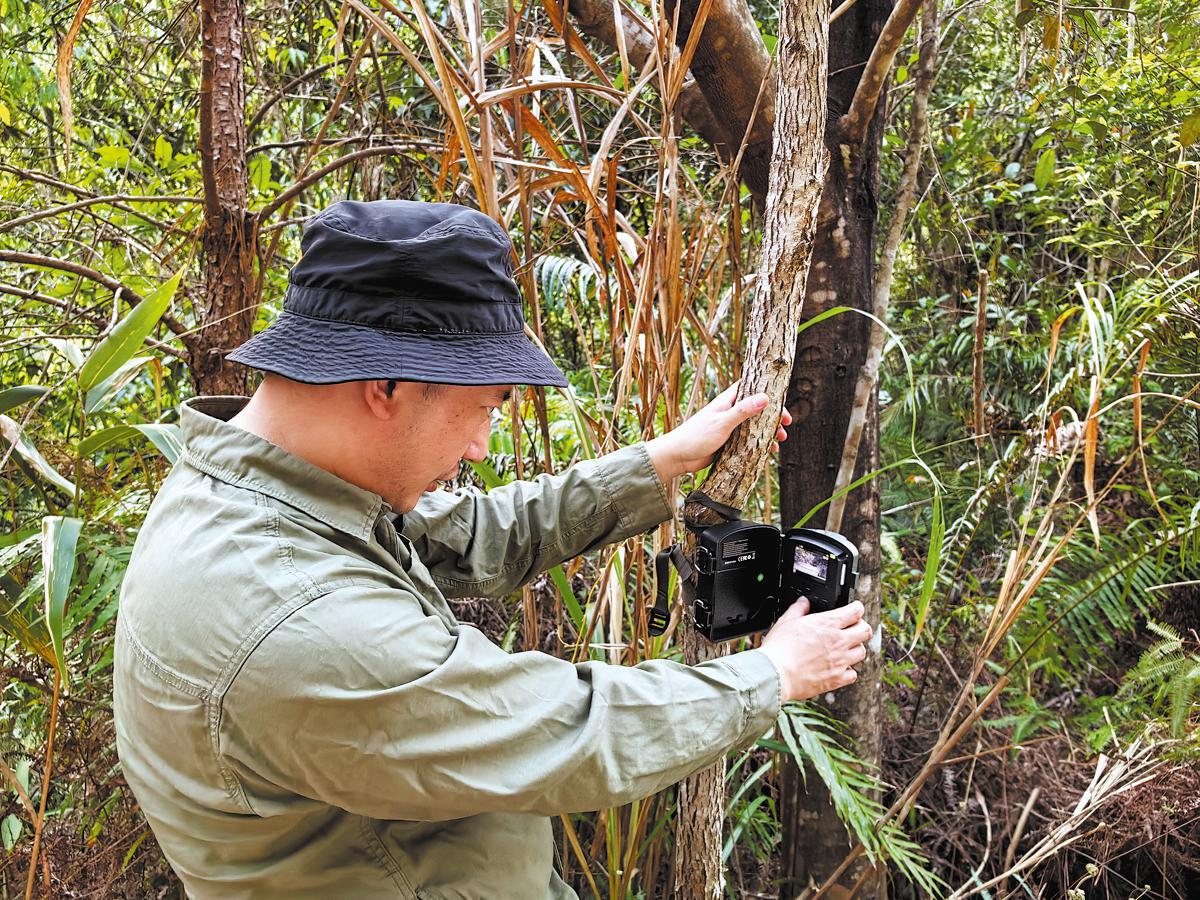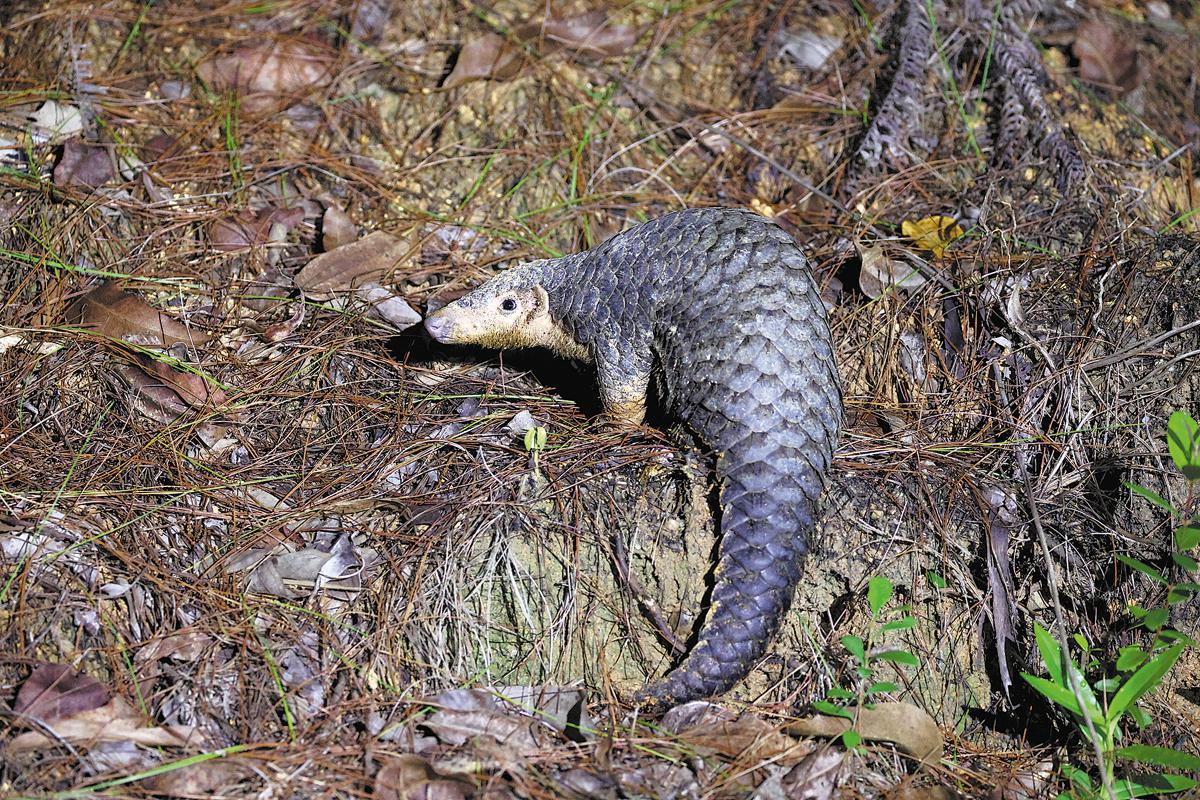Pangolin protection takes pride of place
Nature reserve in Huidong county, Guangdong province, spearheads efforts to safeguard secretive species

Editor's note: As protection of the planet's flora, fauna and resources becomes increasingly important, China Daily is publishing a series of stories to illustrate the country's commitment to safeguarding the natural world.

The odds have long been stacked against the Chinese pangolin, the secretive scaled mammal native to the northern Indian subcontinent, northern Southeast Asia and southern China, due to it being prized by some for its meat and medicinal properties.
Thought to be one of the most trafficked animals on the planet, the Chinese pangolin has become a symbol of reinvigorated protection efforts in one county in South China's Guangdong province, spurring a campaign to prevent hunting and raise awareness of the ecological importance of the species.
In Huidong county, Li Cheng, a former tech engineer turned conservationist, has spent the past seven years working to reverse the Chinese pangolin's critically endangered status. The ranger, who oversees the forest, monitors ecosystems and enforces laws, describes pangolin sightings as like "winning the lottery".
Because Chinese pangolins live such secluded lives, sleeping during the daytime in burrows and emerging in the early evenings to forage for ants and termites, no accurate population studies have been able to estimate their numbers in the wild.
A recent report released on World Pangolin Day, which fell on the third Saturday in February every year, claimed that one pangolin is poached every five minutes either for its meat or for its scales and blood to be used for medicinal purposes.
The international commercial trade of pangolins was banned in 2016 under the United Nations Convention on International Trade in Endangered Species of Wild Fauna and Flora.
For Li, his conservation journey began in 2017 while on a biodiversity survey in Huidong county's Lianhuashan Baipenzhu Provincial Nature Reserve. What he found was what he described as a dystopian landscape — forests littered with traps and snares set by poachers, maimed goats dragging half-severed legs, and a pangolin population decimated by as much as 95 percent since the 1990s.
"I saw a wild boar die from an infected snare wound. That's when I realized just monitoring and algorithms couldn't fix this," Li said.
The following year, Li abandoned his tech career to establish the Xizi River Conservation Center in the nature reserve.

Changing attitudes
His first recruits actually came from the group of people he intended to fight against.
Xu Zhuduo, 56, was a third-generation poacher, but now works with Li at the conservation center.
Xu is one of many poachers who've changed their ways due to campaigning to raise awareness of the plight of the Chinese pangolin and its importance to the environment.
"I once trapped pangolins and sold them for thousands of yuan per kilogram," he said. "Now I protect them — that's how karma works, I guess."
The indigenous people living in the mountainous regions of Huidong county have historically and ancestrally relied on hunting and gathering for their livelihood.
Li said it has been a hard task convincing them to change their ways, but people have gradually realized the relationship between environmental protection and sustainable living, finding better ways to coexist with the environment.
Conservation work is a long slog, but some progress has emerged.
In 2018, infrared cameras set up in the area across 60 square kilometers observed just 62 pangolins. In the most recent survey, 100 individuals were observed across 120 sq km of protected forests.
Last month, a mother and cub were filmed just 500 meters away from Zuokeng Primary School, very close to a place of human activity — something unthinkable five years ago, Li said.
For the children at the school, the experience was not only exciting but it reaffirmed the importance of their learning in the classroom.
"Pangolins are first-class protected animals — harming them is illegal," said sixth-grader Xu Yiqin with the conviction of a seasoned ranger.
The school's corridors double as galleries of ecological advocacy. A mural by Xu Zhiting, 11, depicts a pangolin shielded by children under the slogan "Protection Starts With Me". Another shows a pangolin cradling the Earth, its scales morphing into continents.
Pangolin protection efforts in Huidong received a further boost when Chinese singer Wang Yibo visited the county last year to help build 10 wildlife bridges over hydropower canals, enabling animals to cross from one side to the other safely.
Infrared footage taken just weeks later showed pangolins scaling the log crossings.
Similar cameras have revealed the importance of the Chinese pangolin in the natural environment. Their abandoned burrows become critical refuges for species like leopard cats and squirrels, who store their nuts in the vacant chambers.
It's estimated that a single pangolin can consume around 70 million ants and termites over a single year, protecting trees from damage, and in Huidong, saving over 30 mature trees annually, according to Li.

Advocacy in action
The more than 100 infrared cameras Li and his team have set up in the reserve transmit real-time alerts whenever poachers or pregnant pangolins pass.
"We've coded artificial intelligence techniques to identify species from paw prints," he said, demonstrating an app mapping burrow locations.
This technology, combined with the experience of former poachers like Xu, greatly inform the team's protection work.
"Pangolins prefer rainy days for digging when the soil is softer," said Xu, adding that such times are good for surveying.
A greener approach has seeped into the way of life of many residents in Huidong county.
In Zuokeng village, located in the reserve, conservation has become an economic lifeline. Once reliant on logging, dozens of families now farm chemical-free rice through a cooperative launched in 2020.
"Their rice sells at premium prices because buyers trust its cleanliness," Li said.
Nearby, government-funded homestays built alongside pangolin habitats hosted growing numbers of ecotourists last year.
"City families come to experience nature," said Xu, noting that he often takes visitors on guided forest walks.
One pivotal moment came when villagers discovered a stranded pangolin pup near an irrigation canal last year — a rare occurrence given the species' elusive nature. Nursed back to health by Li's team, its successful release became a local sensation, with residents gathering to witness the event.
"In the past, such a find might have ended differently," Li said. Since 2019, community-reported rescues have risen steadily, paralleling a decline in illegal hunting. Community reports of wildlife encounters now arrive weekly, with villagers increasingly alerting rangers to injured animals or fresh burrows.
"Every phone call marks a shift in consciousness," Li said, recalling the early years when such collaboration was unthinkable.
Where 11 species were once cataloged in the reserve, 17 now appear regularly, including leopard cats.
While concrete tourism revenue figures remain guarded, the ripple effects are visible — from new textbooks at Zuokeng school to solar panels powering ranger stations, all funded by eco-visitor contributions.
Most telling, perhaps, are the absences: patrol logs show snare removals have dropped by two-thirds since 2019, while the survival rate of rescued pangolins now exceeds 80 percent. "Data comforts, but seeing cubs thrive where traps once ruled — that's our true metric," Li said.
In 2020, China elevated pangolins to Class I protected status under the Wildlife Protection Law, imposing penalties of up to 15 years imprisonment for trafficking. While life sentences apply only in cases involving exceptionally large quantities (over 500 pangolins), this legal escalation has deterred poachers.
In 2023, a dedicated wildlife crime task force was established in Baokou town, located near the reserve, to accelerate prosecutions.
In December, Wuqinzhang in Huidong county became a pangolin-focused site on Alipay's green Ant Forest project, attracting 20 million virtual "guardians".
Wang Demin, Lin Wenya and Long Yongjing contributed to this story.
Contact the writers at yandongjie@chinadaily.com.cn
























